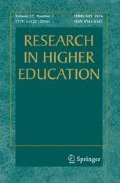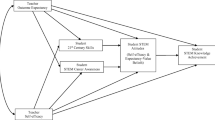Abstract
We undertake a quantitative analysis of the determinants of satisfaction among international graduate students at one university. We focus on satisfaction in three areas: academic program, academic appointment, and nonacademic social relationships. Determinants of satisfaction are theoretically classified as individual resources (e.g., language skills), social resources (e.g., contact with U.S. students), and social context (e.g., perceived discrimination). Multiple regression analysis reveals that academic satisfaction is most strongly related to contact with U.S. students, language skills, and perceived discrimination. Social satisfaction is linked with marital status, language skills, perceived discrimination, and contact with U.S. students. Students' gender, grades, aspirations, and financial situation had no relation to satisfaction.
Similar content being viewed by others
References
Adelegan, F. O., and Parks, D. J. (1985). Problems of transition for African students in an American university.Journal of College Student Personnel 26: 504–508.
Agarwal, Vinod B., and Winkler, Donald R. (1985). Migration of foreign students to the United States.Journal of Higher Education 56: 509–522.
Akinniyi, Gloria O. (1992). The effect of foreign students' perceptions of their relationship with the International Office of Personnel.College Student Journal 26: 215–222.
Burke, Peter J. (1991). Identity processes and social stress.American Sociological Review 56: 836–849.
Fasheh, Munir (1984). Foreign students in the United States: An enriching experience or a wasteful—?Contemporary Educational Psychology 9: 313–320.
Fletcher, Joseph F., and Stren, Richard E. (1989). Language skills and adaptation: A study of foreign students in a Canadian university.Curriculum Inquiry 19: 293–308.
Gao, Ge, and Gudykunst, William B. (1990). Uncertainty, anxiety, and adaptation.International Journal of Intercultural Relations 14: 301–317.
Heikinheimo, P. S., and Shute, J. C. M. (1986). The adaptation of foreign students: Student views and institutional implications.Journal of College Student Personnel 27: 399–406.
Herbert, Wray (1982). Abroad in the U.S.: Foreign students on American campus.Educational Record 62: 68–71.
Lee, Motoko Y., Abd-Ella, Mokhtar, and Burks, Linda A. (1981).Needs of Foreign Students from Developing Nations at U.S. Colleges and Universities. Washington, DC: National Association of Foreign Student Affairs.
Manese, Jeanne E., Sedlacek, William, and Leong, Frederick T. (1988). Needs and perceptions of female and male international undergraduate students.Journal of Multicultural Counseling and Development 16: 24–29.
Marion, Paul B. (1986). Research on foreign students at colleges and universities.New Directions for Student Services 36: 65–82.
Meleis, A. I. (1982). Arab students in Western universities: Social properties and dilemmas.Journal of Higher Education 53: 439–447.
Mixond, J. Wilson, Jr., and Wan, Weidong (1990). International demand for American higher education: An extension.Research in Higher Education 31(2): 129–134.
Open doors 1991/92.Annual Census of Foreign Students. New York: Institute of International Education.
Owie, I. (1982). Social alienation among foreign students.College Student Journal 16: 163–165.
Pearlin, Leonard I., Lieberman, Morton A., Menaghan, Elizabeth G., and Mullan, Joseph T. (1981). The stress process.Journal of Health and Social Behavior 22: 337–356.
Perrucci, Robert, and Perrucci, Carolyn C. (1990). Unemployment and mental health: Research and policy implications. In James R. Greenley (ed.),Research in Community and Mental Health: Mental Disorder in Social Context (pp. 237–264). Greenwich, CT: JAI Press.
Rosenberg, Morris (1979).Conceiving the Self. New York: Basic Books.
Schram, Judith L., and Lauver, Phillip J. (1988). Alienation of international students.Journal of College Student Development 29: 146–150.
Selby, Henry A., and Woods, Clyde M. (1966). Foreign students at a high-pressure university.Sociology of Education 39: 138–154.
Selltiz, Claire, Christ, June R., Havel, Joan, and Cook, Stuart R. (1963).Attitudes and Social Relations of Foreign Students in the United States. Minneapolis: University of Minnesota Press.
Shenkar, Oded, and Ronen, Simcha (1987). The cultural context of negotiations: The implications of Chinese interpersonal norms.Journal of Applied Behavioral Science 23: 263–275.
Spradley, James P., and Phillips, Mark (1972). Culture and stress: A qualitative analysis.American Anthropologist 74: 518–529.
Surdam, Joyce E., and Collins, James R. (1984). Adaptation of international students: A cause for concern.Journal of College Student Personnel 25: 240–245.
Turner, R. Jay (1981). Social support as a contingency in psychological well-being.Journal of Health and Social Behavior 22: 357–367.
Valdez, R. (1982). First-year doctoral students and stress.College Student Journal 16: 30–37.
Ward, Colleen, and Searle, Wendy (1991). The impact of value discrepancies and cultural identity on psychological and socioculturel adjustment of sojourners.International Journal of Intercultural Relations 15: 209–225.
White, A. J., and Brown, S. E. (1983). Academic factors affecting the scholastic performance of international students.College Student Journal 17: 268–272.
Yeh, Eng-Kung (1979). Psychiatric implications of cross-cultural education: Chinese students in the U.S.A.Acta Psychologeia Taiwanica 21: 1–26.
Ying, Yu-Wen, and Liese, Lawrence H. (1990). Initial adaptation of Taiwan foreign students to the United States: The impact of prearrival variables.American Journal of Community Psychology 18(6): 825–945.
Author information
Authors and Affiliations
Rights and permissions
About this article
Cite this article
Perrucci, R., Hu, H. Satisfaction with social and educational experiences among international graduate students. Res High Educ 36, 491–508 (1995). https://doi.org/10.1007/BF02207908
Issue Date:
DOI: https://doi.org/10.1007/BF02207908




